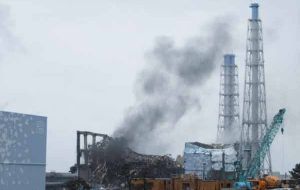MercoPress. South Atlantic News Agency
Fukushima nuclear plant seems ‘stabilized’ but smoke emissions continue
 More than 350.000 people are still living in evacuation centres (Fukushima Photo Reuters)
More than 350.000 people are still living in evacuation centres (Fukushima Photo Reuters) Efforts have resumed at Japan's Fukushima Daiichi nuclear power plant to restore electrical power and cool its overheated reactors, seriously damaged by the 11 March earthquake.
The work was interrupted after emissions of white vapour and smoke from two of the reactors. Japan's chief cabinet secretary says it is impossible to say what the cause is.
The plant's operators are unable to see what's going on inside the buildings housing the reactors, he added. Workers at the plant have been battling to cool reactors and spent fuel ponds to avoid a large-scale release of radiation.
On Tuesday morning, police said the death toll had risen to 9,079, while 12,645 people were listed as missing. More than 350,000 people are still living in evacuation centres in northern and eastern Japan, many of them short of food and water.
The Chief Cabinet Secretary, Yukio Edano, said a new government committee would meet regularly to co-ordinate with social agencies and ensure the evacuees were getting the support they need.
The government has also relaxed stockpiling rules on fuel wholesalers in a bid to get more fuel to the affected areas.
The US Nuclear Regulatory Commission - whose staff is in Tokyo conferring with the Japanese government and industry officials - said the Japanese nuclear crisis appeared to be stabilising. The NRC said that reactors 1, 2 and 3 had some core damage but their containment was not currently breached.
Early on Tuesday, white vapour was seen rising from reactor 2 and hazy smoke from the reactor 3.
Meanwhile, the government has ordered a halt to some food shipments from four prefectures around the Fukushima nuclear plant, as concern increases about radioactive traces in vegetables and water supplies.
Villagers living near the plant have been told not to drink tap water because of higher levels of radioactive iodine.
The suspension - which the government said was just a precaution - applies to spinach from the prefectures of Fukushima, Ibaraki, Tochigi and Gunma, as well as milk from Fukushima.
Over the weekend spinach and milk produced near the nuclear plant was found to contain levels of radioactive iodine far higher than the legal limits.
The World Health Organization said it had no evidence of contaminated food reaching other countries. However, China, Taiwan and South Korea have announced plans to toughen checks of Japanese imports.




Top Comments
Disclaimer & comment rulesCommenting for this story is now closed.
If you have a Facebook account, become a fan and comment on our Facebook Page!